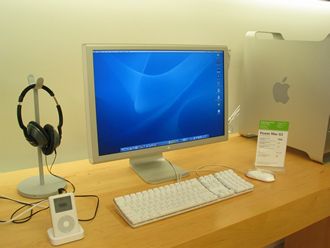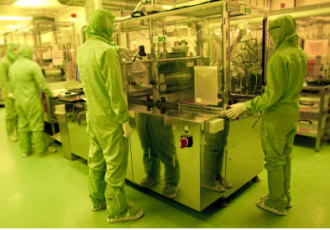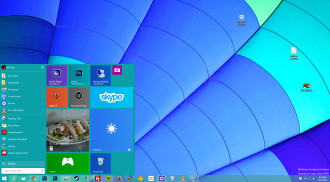 Giant South Korean chaebol Samsung had 22.8 percent of the LCD TV market last year, outstripping the second Korean player, LG Electronics.
Giant South Korean chaebol Samsung had 22.8 percent of the LCD TV market last year, outstripping the second Korean player, LG Electronics.
 Giant South Korean chaebol Samsung had 22.8 percent of the LCD TV market last year, outstripping the second Korean player, LG Electronics.
Giant South Korean chaebol Samsung had 22.8 percent of the LCD TV market last year, outstripping the second Korean player, LG Electronics.
 If Apple thinks it will have its own way in the smart watch category this year, it had better think again.
If Apple thinks it will have its own way in the smart watch category this year, it had better think again.
 VMware has announced new programs and other initiatives for its partner network.
VMware has announced new programs and other initiatives for its partner network.
The announcement, made at this week’s VMware Partner Exchange 2015, is tied to the outfit’s cunning plan to push “business transformation in the mobile cloud era”.
The VMware Partner Professional Services Programme will let consulting partners to sell and deliver their own services. Partners will have free access to experienced software-defined data centre architects and experts. They will also get access to customer-focused labs along with training discounts, the company said.
The scheme is only available to a limited number of pilot partners in the first half of fiscal 2015, the program is expected to expand in the second half of the year.
VMware has been expanding its VMware vCloud Air Network Programme to include managed services opportunities for vCloud Air Network service providers. This will enable partners to use VMware vCloud Air as their core infrastructure while providing differentiation through their managed services. This gives partners more flexibility in how to build and offer cloud solutions. The new managed services model will be available in the second quarter to qualified service providers.
 According to numbers from RedMonk, a tech-industry analyst firm, while Apple’s development language Swift is growing it has a mountain to climb before it will rival the ever popular Javascript.
According to numbers from RedMonk, a tech-industry analyst firm, while Apple’s development language Swift is growing it has a mountain to climb before it will rival the ever popular Javascript.
The tame Apple Press is doing its best to talk up the rise of Swift, but the real news from RedMonk’s list of the most-used languages survey is that Javascript is continuing to grow like topsy. Swift has risen from obscuring to one of the top 22 languages but given that is two spots below an OS called “groovy” we don’t think it is making that much of a splash.
The top ten are
JavaScript edged Java for the top spot in the rankings, but as always, the difference between the two is so marginal as to be insignificant.
The Top 10 was effectively static. C++ and Ruby jumped each one spot to split fifth place with C#, but that minimal distinction reflects the lack of movement of the rest of the “Tier 1,” or top grouping of languages.
PHP has not shown the ability to unseat either Java or JavaScript, but it has remained unassailable for its part in the third position. After a brief drop in Q1 of 2014, Python has been stable in the fourth spot, and the rest of the Top 10 looks much as it has for several quarters.
In fact rather than Swift, Red Monk predicts that Go is doing the best. Six months ago it was predicted that it would become a Top 20 language within six to twelve months. Six months following that, Go can consider that mission accomplished. Go jumped over Visual Basic, Clojure and Groovyand displaces Coffeescript entirely – to take number 17 on the list.
Red Monk said that Julia and Rust are the two notable languages to watch, Julia and Rust’s growth has typically been in lockstep, though not for any particular functional reason. This time Rust outpaced Julia, jumping eight spots to 50 against Julia’s more steady progression from 57 to 56.
 It is looking like President Barack Obama’s “Big Data” privacy plans might get through the Republican controlled Congress.
It is looking like President Barack Obama’s “Big Data” privacy plans might get through the Republican controlled Congress.
He has proposed action on a series of laws to address “Big Data” concerns, but most have not gone anywhere when many corporations want to collect data to sell products, and are telling their paid politicians to vote them down.
This was the reason that a proposal to update the outdated Electronic Privacy Communications Act to protect email and other data stored in the cloud died.
However that is starting to change after public concerns over privacy and cybersecurity that have been amplified by high-profile hacking of credit card data at companies such as Target and Home Depot.
First up is a law being put through by Indiana Congressman Luke Messer, the chairman of the House of Representatives Republican Policy Committee, and Democrat Jared Polis of Colorado, an Internet entrepreneur who founded a network of charter schools.
He is pushing a student privacy bill which will stop big corporates collecting data on kids. The lawmakers have worked on the issue with privacy advocates and more than 100 companies including Microsoft, Google and News Corp subsidiary Amplify to develop a privacy pledge to prevent misuse of data collected in classrooms.
The law will make sure that data collected from students is used only for educational and legitimate research purposes.
Obama wants to go further and has proposed a new national standard to require companies to tell consumers within 30 days from the discovery of a data breach that their personal information had been compromised.
However, there are a patchwork of differing state regulations, which might put a spanner in the works.
Obama is also worried about how Big Data could be used to discriminate against people based on race or where they live for housing or jobs.
On Thursday, the White House will release a report on how companies use Big Data to offer different prices to different consumers saying that Big Data techniques have “turbocharged” price discrimination. Those sorts of laws will hack off the US corporate sponsors of the US political system, and might also die. But US reports are optimistic that Obama might win that one.
 Paypal executive Don Kingsborough, who helped get the outfit to move into physical retail stores, stepped down in January.
Paypal executive Don Kingsborough, who helped get the outfit to move into physical retail stores, stepped down in January.
Kingsborough was instrumental in PayPal’s attempts to push innovations such as in-store ordering and pickup and physical-checkout payment at chains.
His exit comes as the company competes with the likes of fast-growing startup Square to get its payments system adopted in more retail chains across the United States.
The company increasingly has had to contend with rivals such as Square, which is popular with smaller businesses, and the Tame Apple Press thinks that it will have to surrender ground to Apple Pay, even if take up from that is proving sluggish.
The thought is that Paypal is slowing. eBay said it enjoys “a strong foothold in offline retail,” but analysts say it has been difficult for the tech companies vying for checkout space to contend with the simple convenience of debit or credit cards.
No one is saying why Kingsborough is leaving. It seems that he might have been frustrated that he could not so as much as he wanted.
One quote attributed to him was “!I think we were able to move the needle, but I have to say I leave a little frustrated in that I wish we as an executive team would have done more.”
eBay is also preparing to lay off some seven percent of its workforce, or 2,400 jobs, including PayPal employees, before the two companies split in the second half of 2015.
 BT has finalised its deal to buy EE from Orange and Deutsche Telekom for £12.5 billion.
BT has finalised its deal to buy EE from Orange and Deutsche Telekom for £12.5 billion.
According to the International Business Times , the deal, is to be officially completed by the end of the year, will be settled in cash and shares.
While the deal has been rumoured for a while, it is now official. It looks like once the agreement has been settled, the German Deutsche Telekom will have a 12 percent stake in the company and will be given the right to appoint one board member.
Orange will also get a four percent stake.
BT will raise £1 billion of the deal through issuing new shares and debt financing, with the view of making £360 million of capital expenditure in four years savings as a result of the deal.
BT CEO Gavin Patterson said: “This is a major milestone for BT as it will allow us to accelerate our mobility plans and increase our investment in them. The UK’s leading 4G network will now dovetail with the UK’s biggest fibre network, helping to create the leading converged communications provider in the UK. Consumers and businesses will benefit from new products and services as well as from increased investment and innovation.”
The deal comes after broadband providers have started to offer quad-play packages, providing customers with TV, broadband, landline and mobile services in one bundle.
BT will now join Virgin Media and TalkTalk, who already offer these deals to UK consumers.
CEO of EE, Olaf Swantee added: “Joining BT represents an exciting next stage for our company, customer, and people. In the last few years alone, we have built the UK’s biggest, fastest and best 4G network, significantly advancing the digital communications infrastructure for people and businesses across Britain.”
Following in BT’s footsteps is Sky, who struck a deal with Three Mobile last week to offer similar quad-play deals in 2016.
 Data protection authorities in the European Union are getting edgy about Facebook’s privacy policy, it’s been reported.
Data protection authorities in the European Union are getting edgy about Facebook’s privacy policy, it’s been reported.
 A company based in Cambridge claimed that by the end of this year it will produce properly flexible displays by the end of this year.
A company based in Cambridge claimed that by the end of this year it will produce properly flexible displays by the end of this year.
 While the conventional Windows PC market continues to decline, it appears to be losing market share to Apple’s range of PCs.
While the conventional Windows PC market continues to decline, it appears to be losing market share to Apple’s range of PCs.
 Although there’s still a clear lack of standards with different vendors vying to take the lead, many organisations are getting ready for the internet of things (IoT).
Although there’s still a clear lack of standards with different vendors vying to take the lead, many organisations are getting ready for the internet of things (IoT).
![]() Electronics giant Sony appears to be pulling out of its death spiral.
Electronics giant Sony appears to be pulling out of its death spiral.
The consumer electronics firm said on Wednesday preliminary results showed that operating profit had doubled to $1.52 billion in the October-December quarter, while sales rose 6 percent.
This was well ahead of what the cocaine nose jobs of Wall Street expected and they rushed from their expensive loos screaming “buy, buy, buy.”
To be fair, the company is not home and hosed yet. In fact it could not even be said to be at the front gate contemplating a nice hot bath and a rigorous toweling down.
Sony also forecast a preliminary full-year net loss of $1,44,841,1900 but since this was better than the than its forecast last October estimating a net loss of $ 1,959,616,100 for the year no one appears to be quibbling.
The company had said it would delay announcing the official results for the third quarter as its Hollywood studio struggled to recover from a massive hacking of its computer systems. The company, in the midst of a restructuring, said on Wednesday its Chief Executive Kazuo Hirai would announce a “new business strategy” on February 18.
The company will cut 2,100 jobs in the unit by the end of the next fiscal year through March 2016, including around 1,000 cuts already announced.
Sony’s image sensors have emerged as one of its best performing product lines in recent quarters.